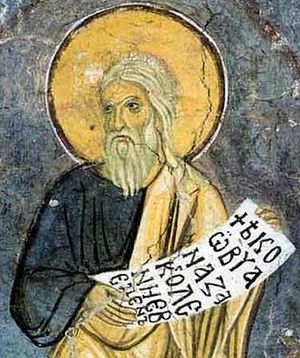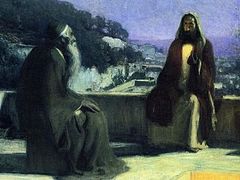We continue with our apologetic project of commending the Christian Faith to our Jewish neighbours, and today look at the life of Jesus as the fulfillment of the prophetic elements in the Law, the Prophets, and the Psalms (compare Luke 24:44-47).
Right at the outset a problem confronts us in dealing with the notion of an ancient literature containing prophetic intimations of the future life of Jesus—namely, the modern prejudice against the very notion of prophecy. Ancient peoples had no problem with the idea that men’s words could be inspired by God/ the gods and so predict things which had not yet come to pass. Pagans had recourse to all kinds of divination, such as visits to shrines like the one at Delphi and to the venerable prophecies of the Sibyl. The Jews believed that their own prophets had knowledge of the things to come, and so had no difficulty in principle with the idea that their Scriptures could predict details from the life of the Messiah. They found in the prophets intimations of events in their own day (such as the famous application the prophecy in Numbers 24:17 about a star coming forth out of Jacob to the Messianic pretender in the second century, styled Bar Kochba, “son of a star” after this prophecy). But most moderns reject the very possibility of such prophecy, along with all hint of the supernatural. For most moderns (including many modern Jews) the Bible is a collection of ancient books containing human wisdom, but with no divine supernatural elements. We therefore confront a prejudice against the very possibility of genuine prophecy. What are we to do?
For those who admit the possibility of the prophetic—like Orthodox Jews—there is no problem, and we can proceed immediately to lay before them the evidence. For others the best we can do is lay out the evidence and ask whether the amassed abundance of co-incidences of ancient poetry with the life of Jesus isn’t just a little too coincidental to be simply a series of coincidences. One or two coincidences might be reasonably discounted, but after a while, when the coincidences begin to pile up, a reasonable person will be open to rethinking secular dogmas and prejudices.
In making the case, it is important to state what we are suggesting and what we are not suggesting. In particular we are not suggesting that the writers of the ancient oracles had as full a knowledge of Christ as we do. We are not suggesting that they knew all the facts of the life of Jesus and entertained a full and complete understanding of His life and ministry. We do not suggest that they were in all respects like Christians after the day of Pentecost with the sole difference that Christians knew by hindsight and history while they knew by prophetic revelation. The New Testament itself shuts the door to such a possibility: “The prophets who prophesied of the grace that was to be yours searched and inquired about this salvation. They inquired what person or time was indicated by the Spirit of Christ within them when predicting the sufferings of Christ and the subsequent glory. It was revealed to them that they were serving not themselves, but you, in the things which have now been announced to you” (1 Peter 1:10-12). In other words, the prophets were in the dark about the details of Christ’s life and how it would all fit together. They were told that these prophecies were for a time far in the future, and not for their own day. The prophets and psalmists, for all their inspired words, were not Christian theologians. The case for Christianity allows them to remain men of their own time.
In speaking of the prophetic element in the ancient prophets and the Psalter, we must resist the temptation to treat this ancient literature as if it were a collection of predictions like those of Nostradamus. A sound and scholarly exegesis demands that we first treat the texts as grounded in their original historical context, and only then begin to mine them for second meanings and prophetic content. This is particularly true when dealing with the Psalms, which must be first regarded as poetry and only then as prophecy. The Psalms were dealing with the hopes and aspirations of the House of David and the people of Israel, both of which had been promised a glorious destiny by God. These poems expressed this hope for future glory, and so it is not unreasonable to insist that the full meaning of the poems be found in events after their time of writing.
We turn now to several examples of poetry from the Psalms. In Psalm 69:7-9 we read of the psalmist getting into trouble for the zeal he shows in the Temple of God, so that he becomes a stranger even to his own family and friends. In Psalm 78:2 we read of the psalmist teaching in parables. In Psalm 89:26 the psalmist cries to God and addresses Him as “my Father”. In Psalm 31:13 the psalmist complains of enemies who scheme together and plot to kill him. In Psalm 41:9 we hear how the psalmist’s close friend who ate his bread lifted up his heel against him. In Psalm 55:20-21 we read of the psalmist and his friends being betrayed by his companion, whose loyal words were hypocritical. In Psalm 27:12 the psalmist is surrounded by false witnesses who breathe out violence. In Psalm 35:11 malicious witnesses rise up who requite the psalmist evil for the good he has done. In Psalm 109:3 the psalmist finds himself beset with lying tongues who attack him without cause. In Psalm 2:2 we read of the kings of the earth and rulers taking counsel together against Yahweh and His Messianic king. In Psalm 118:22 the king from the House of David is rejected by all the rulers but later glorified by God, even as builders reject a stone as worthless only to find that later it becomes the valuable cornerstone. In Psalm 22 we read how the Davidic psalmist is forsaken by God (v. 1), scorned and despised (v.6), mocked and derided by the people who taunt him saying, “He committed his cause to Yahweh; let Him deliver him, for He delights in him!” (v. 7-8). In Psalm 69:21 we read of the psalmist abandoned by all and being given vinegar to drink when he is thirsty. He is surrounded by a band of evil-doers, his hands and feet are pierced (Psalm 22:16), and even his clothes are divided among his enemies (v. 18). Yet after all this he will be saved with the final result that all the nations will turn to God (v. 24-27). In Psalm 110:1-4 the king from the House of David sits at God’s right hand, as serves Him as a priest as did Melchizedek.
We may quote also from some of the prophets. In Isaiah 7:14 we read of a child whose life means “God is with us” being born of a virgin. In Micah 5:2 we read that the ruler of Israel will come forth from Bethlehem, the hometown of David. In Isaiah 9:6 we read of a son is given to Israel who will be called “Wonderful Counsellor, Mighty God, Everlasting Father, Prince of Peace”. In Hosea 11:1 we read of God bringing His son out of Egypt. In Isaiah 11:1-2 we read of the Spirit of God resting upon the king from the House of David, and in Isaiah 61:1-3 of him being anointed to bring good news to the afflicted and to bind up the broken hearted. In Isaiah 35:5-6 we read of blind eyes being opened, deaf ears unstopped, the lame leaping up, and mute speaking. In Isaiah 42:1-4 we read of the Messianic Servant not lifting up his voice, but establishing justice in lowly humility. In Zechariah 9:9 we read of the Messianic King coming to Jerusalem, riding on a donkey. In Isaiah 49:7 we read of the Messianic King being abhorred and despised by the Gentiles. In Isaiah 50:6 we read of the Lord’s servant giving his back to the smiters, his cheeks to those who pulled out the beard, and his face for shameful spitting. In Isaiah 52:14 we read of the Messianic King as being marred beyond human semblance; in Isaiah 53 we read of him being despised and rejected, smitten and wounded, of him being bruised for the people’s iniquities and beaten with stripes that they may be healed; of him being oppressed and denied justice, but never protesting; of him being led like a lamb to the slaughter, and of being buried in the grave of a rich man, and of making himself an offering for sin. In Hosea 6:2 we read of Israel finding resurrection after three days. In Daniel 7:13-14 we read of the Son of Man being presented to God and receiving universal dominion from Him. In Jeremiah 31:31 read of God making a new covenant with Israel, one different from the covenant of Moses, and in Jeremiah 3:16 we read that in that day the Ark of the old covenant will not even be missed. In Joel 2:28 we read of the Spirit being poured out upon all flesh, even the most humble of the land.
Those familiar with the life of Jesus will recognize the narrative of that life in the disparate images scattered throughout the Psalms and the Prophets. But these details are not present in the Hebrew Scriptures as parts of a single coherent portrayal of a single individual—and that is the point. The prophetic elements in the Old Testament were not given to fully describe an individual so that he could be recognized in advance. The Old Testament does not present us with a single fully integrated picture, so that the Messiah could be immediately recognized as the Messiah as soon as he emerged. The prophetic elements were deliberately diffused throughout the texts to allow for a free response from the people. The Messiah would be recognized and valued by those whose hearts were tender and open, while the hard-hearted would stumble and refuse to recognize him. This arrangement was the judgment of God, meant both to reward the humble and recompense the proud. As St. Paul would later observe: “Those in Jerusalem and their rulers, because they did not recognize Him nor understand the utterances of the prophets which are read every Sabbath, fulfilled these by condemning Him” (Acts 13:27). The prophetic utterances had to be ambiguous enough for allow for freedom of response.
It is also important to recognize that these utterances were never intended to be received in vacuo, or apart from an experience of Jesus of Nazareth. It was never envisioned that someone would read the Hebrews Scriptures never having heard of Jesus, and then accept Him as the Messiah because certain biographical details of His life coincided with details in the Old Testament. Rather these details were hidden throughout the Scriptures to tip the scales as thoughtful humble men pondered whether Jesus could really be the Messiah.
For there was not one single authoritative version of what the Messiah would be like, but a number of different ones. One who resolutely refused to open his heart to the possibility that the Messiah would notcome as a conquering revolutionary whose task it was to exalt Israel to a place of international supremacy, but might come in humility to offer a spiritual Kingdom to all, will find these prophetic details unconvincing. But a heart which experienced the love of Jesus, heard of His claims to divinity, His miracles, His power to raise the dead, and the news of the empty tomb might well ponder whether the military picture of the Messiah was correct after all. Impressed with the majesty of Jesus’ person and His obvious divine power, such an open heart will find the wealth of Old Testament images which coincided with the life of Jesus not simply coincidental, but prophetic.
Whether or not one finds the prophecies of Jesus in the Hebrew Scriptures convincing therefore depends upon the heart of the one reading those Scriptures and pondering the question. For one who refuses to budge from the concept of a military Messiah bringing a Jewish Kingdom, but who accepts this as a first principle, of course such a person will not find the Old Testament prophecies convincing. But if someone is open to rethinking such a concept, the reflection of the life of Jesus in the Old Testament will prove more compelling. A stubborn heart will refuse to be convinced. To quote Paul, a veil lies over such a heart (2 Corinthians 3:14). It is only when one turns to God in openness and humility that the veil is taken away.





